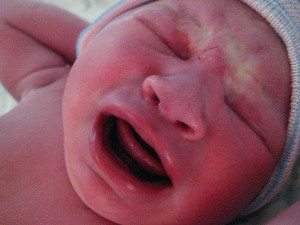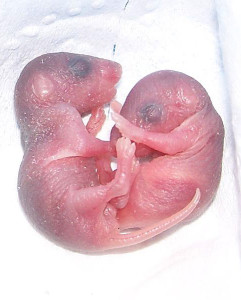Babies suck at a lot of things. They can’t walk. They can’t eat solid foods. They can’t dress themselves or operate a smartphone. They’re also terrible at protecting themselves against infections (which is why anyone going anywhere near a newborn needs to be vaccinated against pertussis and the like). It’s easy to chalk that last one up to just another basic life skill infants have yet to master. Stupid babies, they can’t even mount an effective immune response. But according to a new study published in Nature the immune systems of infants may not be deficient at all, they may be deliberately suppressed by mechanisms in the babies’ own bodies.

Since newborn mice have similarly shoddy immune protection, a team of researchers at the Cincinnati Children’s Hospital conducted a series of experiments comparing 6-day-old mice (the mousy neonatal equivalent) to 8-week-old mice (adults). Not surprisingly, they found that the newborn mice were more prone to dying than the adults when infected with the bacterium Listeria monocytogenes. Additionally, the infants’ bodies were swarming with a thousand times more of these bacteria than the adults 48 hours after infection. So baby mice fared poorly at subduing pathogens. Fair enough. But when the researchers took immune cells from the heartier adult mice and transferred them to the newborns, their ability to battle bacteria didn’t improve. This indicated that a lack of immune cells in baby mice was not the issue, but rather something was rendering these cells useless.
Through further tests the team zeroed in on the culprit – red blood cells carrying a protein called CD71. These CD71+ cells express the immunosuppressing enzyme arginase-2, and are far more plentiful in newborn mice than in adults. In fact, the proportion of CD71+ cells in mice falls in parallel with improved immune system performance as they grow into adults. As CD71+ numbers decline, resistance to pathogens increases. Furthermore, when the team artificially reduced the number of CD71+ cells in newborn mice using antibodies, their susceptibility to Listeria monocytogenes dropped significantly. This would explain why giving baby mice adult immune cells was an unsuccessful strategy. Once the adult cells arrived, they got muzzled just like the infants’ own immune cells.

But why would any sensible organism want to dial down its own immune system? One possibility proposed in the paper is that decreased immunity might help newborns cope with the teeming horde of bacteria that begin to colonize their bodies as soon as they leave the womb. Many of these microbes are beneficial, so an immune system that attempts to kill them off wouldn’t really help the baby in the long run. Additionally, infants are coming into the world from a completely sterile environment. Trying to battle that many bacteria all on at once could create massive inflammation. In support of this, the team found that their CD71+ reduced newborn mice, while better equipped to deal with pathogenic Listeria monocytogenes, also suffered more intestinal inflammation when encountering the healthy bacteria looking to shack up in their guts.
So, at least in mice, the weak immune systems of infants may be an unfortunate byproduct of any otherwise adaptive trait. Of course, further research is needed before we can determine whether such is also the case in humans. Though, similar to the mice, the team did find a higher proportion of CD71+ cells in human umbilical cord blood than in adult blood.
While there’s still much work to be done, the researchers hope that their results will someday lead to therapies that allow infants to selectively reap the benefits of these immunosuppressive cells without the unwanted downsides. For instance, a weak immune system is the reason babies have to wait a month or two before receiving many of their vaccinations, a delay that makes them vulnerable to contracting these diseases from unvaccinated or under-vaccinated older children and adults.
But beyond their possible practical applications, these new findings are also an illustration of how much the bodies of animals and their commensal bacteria have evolved in concert with each other. They’re such an important part of us, it would seem, that we take the trouble to put out a welcome mat for them at the start of our lives.











